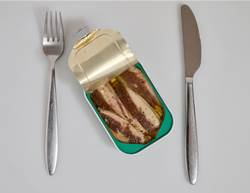You work out most days of the week and eat healthy meals as much as you can, yet the scales shows you’re gaining—not losing—weight, so what gives?
Hormonal belly fat can be the hardest to lose, but keep in mind that weight is complicated. There are a slew of factors that go into your body composition, and hormones are just one aspect.
To make weight loss work for you, it’s important to try to figure out what’s causing you to have excess fat in the first place. Is there room in your diet for improvement? What about your exercise routine? If those are all buttoned up, experts say that hormones may be a factor.
Consider this: as we get older, even a slight disruption in our hormone levels can cause stubborn belly fat to stick. In fact, research suggests that postmenopausal women on hormonal replacement therapy have lower levels of belly fat than those that aren’t.
Conditions like hypothyroidism can also lead to weight gain. Before you rush to your doctor to get a prescription for your hormonal belly, there are natural ways to readjust your levels. Reducing sugar intake, eliminating processed foods from your diet, and cutting back on things like dairy, alcohol, and caffeine can all help you manage your blood sugar and insulin levels, lowering the risk you’ll deal with weight management pitfalls like not feeling full and mindless snacking.
So, how do you know if those love handles are a extra kilos from leaning into pizza and wine night, or a larger issue? Here are six signs your hormones may be to blame.
1. Your waistline is getting bigger, but you’re eating right
If you’ve had a relatively flat stomach for majority of your life and then suddenly that spare tire appears overnight, it may be a sign you’ve developed a hormonal belly. “As we age, the body can become more insulin-resistant, driving your body to store fat instead of burning it off,” explains Dr Sara Gottfried, author of The Hormone Reset Diet.
“Women also become more oestrogen-dominant as we move into perimenopause and beyond. Oestrogen dominance promotes insulin resistance, which causes the belly fat build-up,” she says.
2. You’ve been craving a lot of sugar
Not only can insulin resistance lead to type 2 diabetes, it can have some secondary effects on other important hormones as well. “Insulin resistance can have a knock-on effect on leptin. Leptin is the hormone that alerts your body when you’re full, but elevated insulin levels eventually lead to elevated leptin, as well,” Dr Gottfried explains.
“Elevated leptin, despite what you may think, does not mean you are more likely to put down your fork and stop eating. Consistently elevated leptin levels can lead to a dysfunction of leptin receptors," Dr Gottfried says.
These receptors stop sending signals to the brain to tell you to stop eating. As a result, you do the exact opposite of what leptin is designed to control, and you continue to eat, never receiving the signal to stop.
3. You’re experiencing a lot of mood swings
As women enter the pre- and post-menopausal years, their oestrogen levels fluctuate often, which can lead to mood swings and stubborn weight gain around the midsection. According to a University of Wisconsin study, this is why women are at a higher risk to develop mood disorders than men. The study found that oestrogen levels in women fluctuate most often during reproductive cycle events and menopausal transitions.
This is also the time that most women reported the onset of depression or recurrent depression. Oestrogen levels fluctuate naturally during menopausal bodily changes, which can cause mood swings and lead to weight gain.
That’s why Dr Gottfried says not to blame yourself for excess weight gain. “If you’re struggling to lose excess weight with no success, don’t blame it on a lack of willpower or self-discipline. Most likely your hormones have turned against you,” she says.
Instead, focus on things you can control like your diet and exercise routine. Revamp your meals and be sure to include plenty of vegetables, lean protein, complex carbs, and healthy fats into your diet. These foods will not only keep you satisfied and curb hunger, but they’ll deliver nutrients you need to stave off age-related insulin resistance and muscle loss.
4. You’re constantly stressed
Another major player in the hormonal belly fat game is cortisol. Often referred to as the stress hormone, cortisol levels increase when your body senses you’re overwhelmed anxious, which can lead to stubborn weight gain. According to emergency care physician Dr Jacqueline Montoya, this is because the body goes into fight or flight mode.
“High levels of stress and anxiety can send the body into survival mode which increase our cortisol levels and signals the body to store more fat,” she explains.
5. You’re exhausted all the time but can’t fall asleep
Insomnia and exhaustion can be tell-tale signs that hormones are to blame for your weight gain. Lack of sleep causes fatigue, which leads to stress and insomnia. All these things will mess with your hormones, specifically your cortisol levels.
“High cortisol can lead to decreased thyroid levels, which can cause central weight gain,” Dr Montoya explains. “It can also decrease growth hormones, which are responsible for tissue building, muscle growth, and overall health.”
6. Your periods are off
Perimenopause, the transitional period before menopause, and menopause cause hormonal shifts in your body that can lead to weight gain, says Dr Aviva Cohn, an assistant professor of medicine in the division of endocrinology, metabolism, and research. During perimenopause, you can experience menopause-like symptoms like hot flushes and irregular periods, the Cleveland Clinic says.
And, during menopause, your periods stop altogether. “Oestrogen deficiency as seen after menopause is associated with an increase in belly fat gain,” Dr Cohn says. But hormonal changes that can happen sooner may also lead to an increase in belly fat.
“Hormonal changes, such as decreased levels of oestrogen in women during and after menopause, can also contribute to increased abdominal fat,” says dietitian Scott Keatley.
How to naturally reset your hormones
The main problem with a fighting hormonal imbalance that causes belly fat is that all the issues are cyclical—one issue leads to another and back. That’s why many women have a hard time whittling away a hormonal belly. Aside from medical intervention, there are lifestyle changes you can make to break the cycle and reset your hormones.
“Making conscious day-to-day decisions about what you eat, the amount of exercise you get, how many hours you sleep, and how you handle stressful situations, is key to combatting hormonal imbalances,” Dr Montoya says.
Dr Gottfried suggests overhauling what you eat. “I recommend 40 days of cutting out sugar, gluten, dairy, alcohol, and caffeine,” she says. “Aim to eat [lots] of vegetables daily, such as cruciferous vegetables, along with anti-inflammatory protein. The goal is to reduce nutritional stress by cutting out highly reactive foods.”
In addition to changing your diet, Dr Gottfried suggests considering intermittent fasting. She also advises doing HIIT workouts and getting at least seven to eight hours each night. (If HIIT workouts aren’t right for you, Keatley recommends doing cardio workouts like walking, jogging, swimming, and cycling, along with strength training “which helps maintain or increase muscle mass and metabolism.”)
“Adequate sleep and stress management are crucial because poor sleep and high stress can disrupt your hormones, leading to weight gain or difficulty losing weight,” Keatley says.
But Keatley says that “a multi-pronged approach works best” when it comes to losing belly fat. “This includes a balanced, nutrient-dense diet, regular physical activity, sufficient sleep, and stress management,” he says. “Cutting back on refined carbohydrates, added sugars, and alcohol can be particularly helpful.
Why do hormonal changes cause you to gain belly fat?
Some of this is a mystery, Keatley says. But, he says, “we believe that oestrogen and testosterone are important for the differentiation of fat cells.” And, as oestrogen levels drop in your body when you near menopause or actually go through it, the types of fat your body creates and where it goes on your body changes, he says.
“A decrease in oestrogen levels is associated with the loss of subcutaneous fat—fat stored under the skin—and an increase in abdominal fat,” says women’s health expert Dr Jennifer Wider. Your body also tends to have higher levels of cortisol, i.e. stress hormones around this time, Dr Wider says—and that also can lead to more belly fat.
Foods to eat to combat hormonal belly fat
It’s important to point out up-front that you can’t tell your body where you do (and don’t) want fat to go. “You cannot spot reduce,” Keatley says. Still, you can strive to eat well to maintain a healthy weight. “Foods higher in fibre like beans instead of ‘white’ starches is a great place to start,” Keatley says.
It’s also a good idea to focus on foods that are rich in proteins and low in sugar, while increasing your vegetable intake, says gynaecologist Dr Jessica Shepherd.
Overall, dietitian Jessica Cording, author of The Little Book of Game-Changers, recommends stocking up on fish, poultry, eggs, vegetables, and healthy fats like avocado.
“It is about focusing more on a well-balanced, nutrient-rich diet, that includes plenty of fruits, veggies, and 100% whole grains,” says dietitian Keri Gans, author of The Small Change Diet.
Foods to avoid when you want to fight hormonal belly fat
There are a few foods to take a pass on if you’re trying to avoid weight gain in general, and they apply when it comes to hormonal belly fat, too, Cording says. She suggests doing your best to avoid or minimise how much you have of red and processed meat, added sugar, and alcohol.
Exercises to fight hormonal belly fat
“Overall, what I’ve seen work well is to move more but not just to do more cardio,” Cording says. “It’s making sure that you’re incorporating a combination of cardio and weight-bearing activity.”
Dr Shepherd suggests trying high-intensity interval training (HIIT) and “short bursts of exercise” to rev up your metabolism and lose weight.
Just be mindful of how much you’re exercising. “What we find is that going too hard on the treadmill or the bicycle causes more issues than it solves,” Keatley says. “Balancing an exercise routine between cardio and strength routines while—and this is the most important—giving your body time to recover shows the greatest dividends.”
When to see your doctor
If you have belly fat and it bothers you, experts generally recommend looking at your eating plan and exercise routine first, making tweaks, and seeing where that gets you. But if you’re still not reaching your goals, Dr Cohn says it’s time to talk to your doctor.
“Diet and exercise always have an important impact on weight. However, sometimes when the reason for the weight gain is due to an underlying medical condition—this can be treated directly as well,” she says.
“For instance, if someone has hypothyroidism (a slow thyroid) detected on labs, treating with thyroid hormone in addition to diet and exercise is the preferred method.”
And, if your doctor determines that your belly fat isn’t due to a hormonal condition, they can still offer personalised advice to help get you where you want to be.
Get more tips on how to lose weight over 40.









.jpg&h=193&w=250&c=1&s=1)
